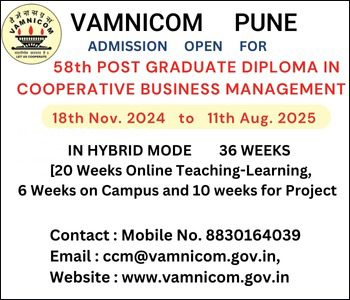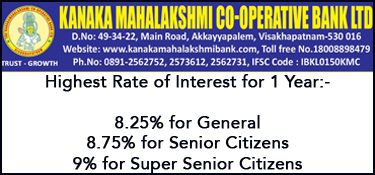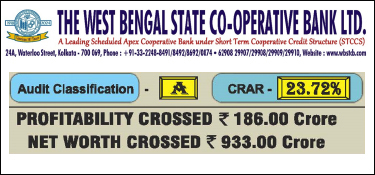National Council for Cooperative Training organised a National Colloquium on Cooperative Training in New Delhi on 31st January, 2014 and 1st February, 2014 at Kempinski Ambience Hotel in New Delhi.
The Colloquium for the first time organised in the history of NCCT with around 200 participants was organised to discuss the current status of cooperative training in the country and draw out an Action Plan for professionalizing cooperative training in the country. The participants comprised of representatives of National Level Federations, NABARD, BIRD, Directors of ICMs and other dignitaries from Government of India and other cooperative organisations.
Shri Mohan Kumar Mishra, Secretary, NCCT came up with opening remarks on the occasion of National Colloquium on Cooperative Training. He extended a hearty welcome to Shri Raghav Chandra, IAS, Additional Secretary and Financial Advisor, Ministry of Agriculture, Department of Agriculture and Cooperation, Government of India and other esteem dignitaries present on the occasion.
Shri Mishra said that the esteem presence of Shri Raghav Chandra, IAS on this occasion was highly encouraging for giving a definite push to the growth of cooperative training in the country.
Shri Mishra welcomed Mr. Chan Ho Choi, Regional Director, ICA (ROAP) and highlighted about his international experience in the field of cooperative development. He further greeted Shri U.S. Saha, General Manager, NABARD, whom he called as friend philosopher and guide for the growth of cooperative training in India.
The quality of training in the recent times has been improved by awarding certification, and in this regard, Shri Mishra welcomed Ms. Shikha, C-PEC, representative from BIRD, whose efforts were applauded by him. Shri Mishra further said that Dr. Dinesh, Director General, NCCT present on the occasion, has been a trainer by heart, and his presence is highly encouraging.
Shri Sanjeeb Kumar Patjoshi, IPS, Director, VAMNICOM was praised for his efforts in providing professional cooperative training at VAMNICOM. Shri Mishra said that building up the technical competence of cooperatives is very important to meet the challenges confronting the cooperatives today. He said that for this, there should be a re-orientation of cooperative training in the country. Shri Mishra also welcomed Dr. Chandra Pal Singh Yadav, Chairman, NCCT for his august presence on the occasion, and in this respect he highlighted his dynamic leadership for the growth of cooperative movement in the country.
Shri Mishra highlighted the following Technical Sessions, which he thought will give a paradigm shift in cooperative training : • Build Capacities of trainers, master trainers and cooperators.
• Enable cooperatives to collaborate with public and industrial organizations including banks for research, training and consultancy with focus on developing training methods and materials.
• Encourage excellence in cooperative training institutions through faculty development and improved management practices and operating systems.
• Review the training policies for enhancing the performance of trainers, teachers and cooperators.
Dr. Dinesh, Director General, National Council for Cooperative Training in his address extended a warm welcome to Shri Raghav Chandra, IAS, Additional Secretary & Financial Advisor, Government of India, Ministry of Agriculture, Department of Agriculture & Cooperation, Dr. Chan Ho Choi, Regional Director, International Cooperative Alliance (ROAP), Shri U.S. Saha, General Manager, NABARD, Ms. Sikha, C-PEC, representative from BIRD and other dignitaries present on the dais besides foreign delegates from Sri Lanka, Nepal, Mauritius, Bangladesh and delegates from different parts of the countries in this big event.
Dwelling on historical evolution, he said that Indian Cooperative Movement is more than 100 3 years old and it has around 6 lakh cooperative societies and more than 25 crore members associated with them. He said that though some of the cooperative sectors are doing well like dairy cooperative, credit cooperative, agriculture input distribution cooperatives, housing cooperatives etc., but large number of cooperatives are in bad shape, and some of them have become sick also.
He stressed that cooperatives have potential to bring in social and economic changes in society, and in this direction, training and HRD play a strong role. He said that there are large number of people associated with cooperatives in the form of employees and members, and we need to train them all to change their mindset to bring in professionalism. He also mentioned that in historical 97th Constitutional Amendment, there is mention of economically viability of cooperatives, and here he emphasised that training will make cooperatives economically viable.
He also shared his experience as a member of Working Group of National Advisory Council, and said that the Group highlighted that though the cooperatives are an important vehicle for transformation, training practice and techniques in cooperative sector have become old fashioned and ineffective. He emphasised that unless we change the manner we train the people, we can not expect desired result. He praised the efforts of NCCT to bring all types of cooperative training institutions on one platform.
He hoped that this Colloquium will be effective to chalk out a common goal and strategy for revamping cooperative training in India. He elaborated that that this will bring in synergy of efforts leading to effective networking for strengthening cooperative training.
Dr. Chan Ho Choi, Regional Director, International Cooperative Alliance (ROAP) expressed his gratitude for being part of the National Colloquium. He recalled the importance given to the principle of Education & Training in the Manchester Congress of 1995, and this principle was basically derived for the Rochadale Pioneer’s ideology. He mentioned that great philosophers and thinkers always thought about the importance of Education & Training.
Dr. Choi further said that as development of any economy depends on Human development, cooperatives should also give importance to HRD. “Training and development has undergone a lot of changes and the recent one is E-learning.
By using the ICT infrastructure we need to efficiently make use of the e-learning facilities”, Dr. Choi further elaborated in detail. He reiterated the need for giving focus on cooperative values because cooperatives are different from others on the basis of values, which include caring for others and social responsibility. He mentioned the four dimensions on which the cooperatives need to focus, which include : (i) Sustainability (ii) participation (iii) Identity (iv) legal framework.
Shri Sanjeev Patjoshi, Director VAMNICOM spoke on the recent scenario of cooperative training in India. He told that persons who come for training are very important. He emphasised that training institutions should analyse their training needs and deliver effective training rather than giving standarised training module.
He also stressed on forming cooperatives in tribal and naxal belt so that the benefits of movement can trickle down to the deprived sections of the society. He also urged to bring in the youth and women in the cooperative fold by creating employment opportunities for them.
Shri U.S. Saha, G.M., NABARD in his address mentioned the role of NABARD in detail, its functions, design of new projects, its key interventions etc. Laying emphasis on Rural Infrastructure Development Fund created by NABARD, Shri Saha said that NABARD is committed to strengthen infrastructure in rural areas.
He further stressed on the role of NABARD in raising the credit absorption capacity as well as raising the flow of credit, which has now increased to Rs. 6.1 lakh crores comes in 2011-12. The promotional role of NABARD in the form of SHG promotion and entrepreneurial development was also mentioned by him. He said that the training institutions through their HRD activity should contribute for sustainability –technological and organisational, which is a big challenge. He assured all support from the side of NABARD for all kinds of development initiatives in the field of cooperative development.
Ms. Sikha, AGM, C-PEC, representative from BIRD, Lucknow speaking on the occasion said that NABARD has taken an initiative in forming the Bankers Institute of Rural Development for providing professional training in the cooperative sector. She said that there are 3 training centres across the country which are located at Lucknow, Mangalore and Kolhapur. She further said that C-PEC was started in the year of 2009 with an ultimate objective of improving human resource development in the cooperative sector which can be achieved by following three strategies :
Accreditation: It is provided by CPEC in order to improve the intellectual capacity as well as infrastructure of the premises.
Standardization: The training inputs have to be developed and the trainers delivery skill has to be improved in a uniform way.
Certification: The certification can be done for the staff and the institutes, in order to maintain and follow the standards.
Ms. Shikha further said that BIRD Lucknow is a unique institution which acts as a regulator and a mentoring body which believes in consultative process. She said that the institute will launch courses in cooperative banking, PACS etc. She hoped that the conference may concentrate on formulating a uniform policy which can be applicable to all the cooperative training units across the country.
Shri Raghav Chnadra, IAS, Additional Secretary & Financial Advisor, Government of India, Ministry of Agriculture, Department of Agriculture & Cooperation started his address by mentioning about various religious, political and social movements. Specifically, he said that Cooperation is a social and economic movement which can align production, process, technology, R&D and human skills.
He highlighted the importance of cooperative movement by considering it as a movement which balances profitability and social welfare, and rights and voices. He pointed out the democratic aspects of a cooperative, in which a small person can become a chairman of a cooperative, which is impossible in a private organisation where the size of a share taken is important in deciding the rights of members.
He raised certain issues which a cooperative needs to focus in the days to come, which include :
(i) Governance : He mentioned about the need for thrust to “Virtuous Triangle” i.e. clients, employees and organisations have to be integrated.
(ii) Competitiveness : By giving emphasis on efficiency as well as productivity, a cooperative organisation should be competitive. This requires adoption of technology in changing world.
(iii) Long term economic value : The need of the hour is to be sustainable by generating value on a long term basis.
(iv) Ethics : The cooperatives need to focus on moral and ethical values, which are very important for cooperatives.
(v) Leadership : Another area where the trainers need to intervene is proper leadership development.
He concluded by saying that no training is ever complete, and likemedicine it has to be administered constantly, then only effective results can be generated. He said that trainees need to be trained further, based on their feedback, so that practical aspects of training can be assessed in work performance.
Dr. Chandra Pal Singh Yadav, Chairman, National Council for Cooperative Training speaking on the occasion of inaugural function of National Colloquium on Cooperative Training and Award Function appreciated the efforts of NCCT to organise this event. He highlighted the objectives of NCUI in short and elaborated that in a developing economy, HRD is considered as judgmental fact of capacity building, education & training.
He said in the prevailing liberalised economy with various challenges, the cooperatives have to become more efficient and competitive, with focus on training methodology. He pointed out that with a view to focus on imparting practical training, NCCT has introduced many professional courses, MBA and sectoral diploma as well as appropriate short-term courses on various disciplines. He lamented that GOI is not considering the sincere efforts and contribution made by cooperative sector in development of Indian Economy.
He also emphasized that 21st century generation youth do not know anything about cooperatives, and it is hightime when Cooperation as a subject should be included in the curriculum of School education. On this occasion, he thanked GOI for amendment of 97th Constitutional Act which has provided fundamental right to form cooperatives, a provision which is found in India only.
While concluding, he was hopeful that this Colloquium will prove to be a right platform for improvement in the working styles of cooperative training institutions, and will come up with various effective measures to overcome the problems being faced by cooperatives in the field of Human Resource Development.
















































